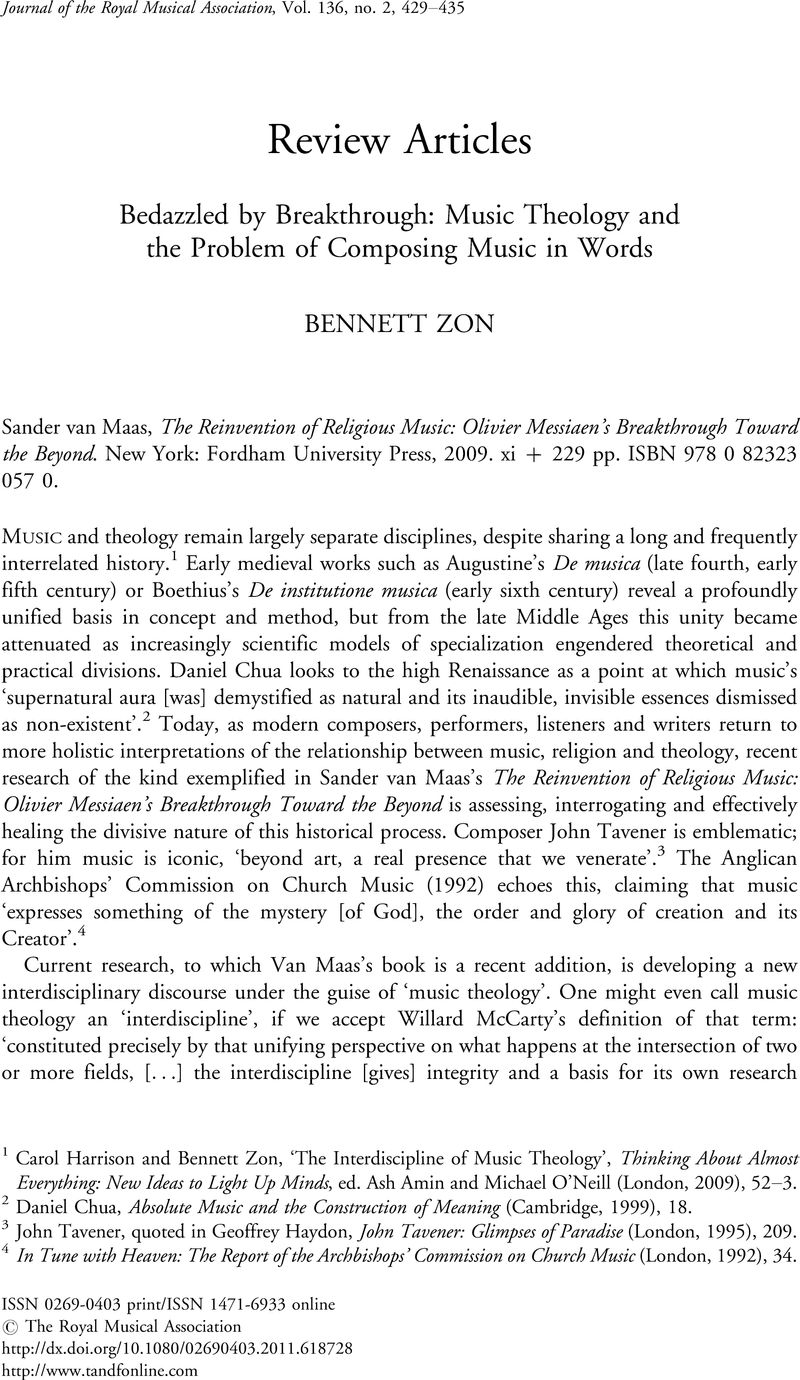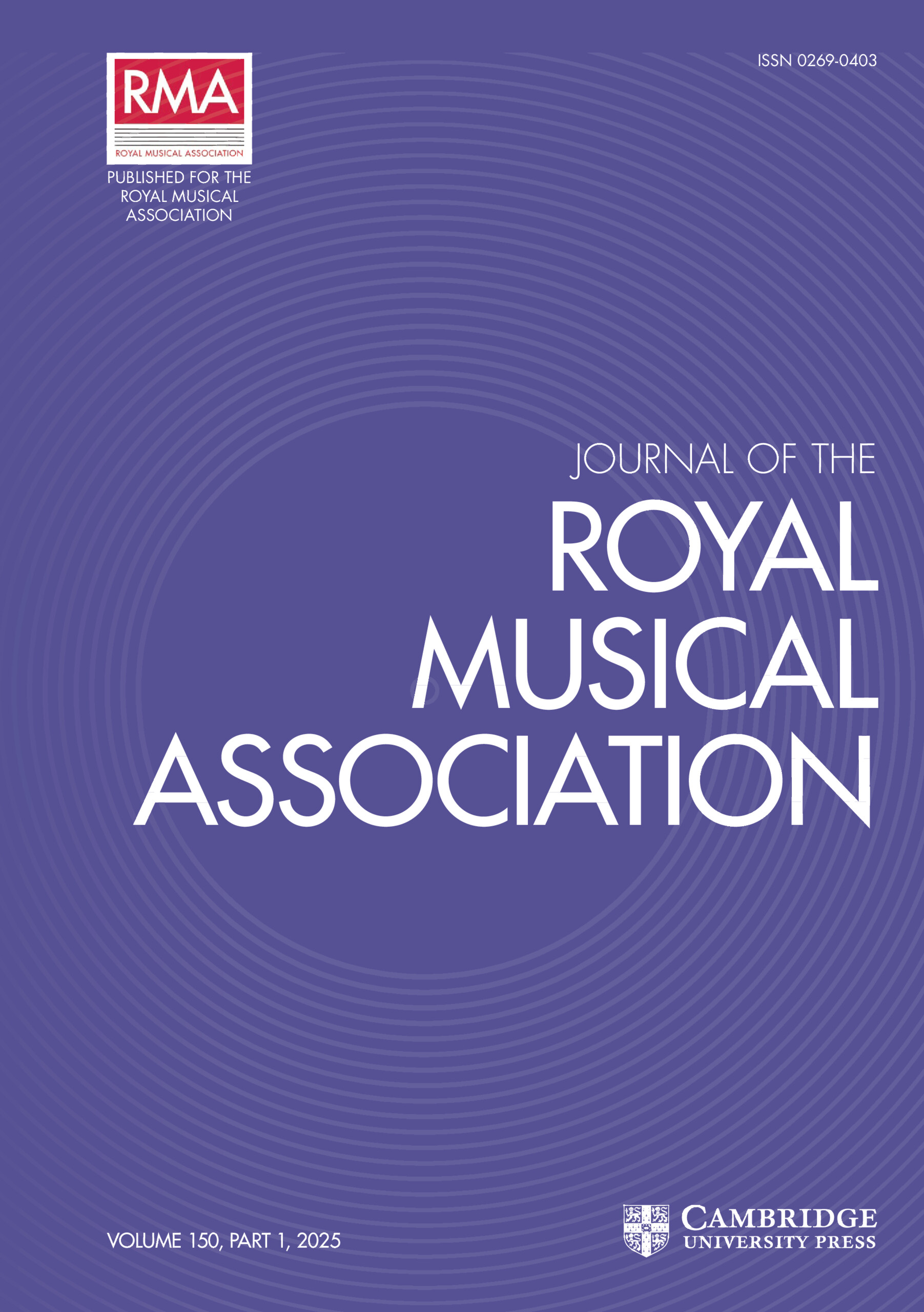No CrossRef data available.
Article contents
Bedazzled by Breakthrough: Music Theology and the Problem of Composing Music in Words
Published online by Cambridge University Press: 01 January 2011
Abstract

- Type
- Review Article
- Information
- Copyright
- Copyright © The Royal Musical Association
References
1 Carol Harrison and Bennett Zon, ‘The Interdiscipline of Music Theology’, Thinking About Almost Everything: New Ideas to Light Up Minds, ed. Ash Amin and Michael O'Neill (London, 2009), 52–3.
2 Daniel Chua, Absolute Music and the Construction of Meaning (Cambridge, 1999), 18.
3 John Tavener, quoted in Geoffrey Haydon, John Tavener: Glimpses of Paradise (London, 1995), 209.
4 In Tune with Heaven: The Report of the Archbishops’ Commission on Church Music (London, 1992), 34.
5 Willard McCarty, ‘Looking Through an Unknown, Remembered Gate: Millennial Speculations on Humanities Computing’, Lansdowne Public Lecture, University of Victoria, 12 February 2001, <http://www.kcl.ac.uk/humanities/cch/wlm/essays/victoria/>, a preliminary version of an article published in Interdisciplinary Science Reviews, 26/3 (autumn 2001), 173–82.
6 John Van Maanen, Tales of the Field: On Writing Ethnography (Chicago, IL, and London, 1988), 5.
7 See Stephen W. Littlejohn, ‘An Overview of Contributions to Human Communication Theory from Other Disciplines’, Human Communication Theory: Comparative Essays, ed. Frank E. X. Dance (New York, 1982), 243–85 (p. 246).
8 John Michael Spencer, Theological Music: Introduction to Theomusicology, Contributions to the Study of Music and Dance, 23 (New York and Westport, CN, 1991), xi.
9 Jeremy Begbie, Theology, Music and Time (Cambridge, 2000), 13–15.
10 Jeremy Begbie, Theology, Music and Time (Cambridge, 2000), 271.
11 Andrew Cyprian Love, Musical Improvisation, Heidegger and the Liturgy: A Journey to the Heart of Hope, Studies in Art and Religious Interpretation, 32 (Lewiston, NY, and Lampeter, 2003), 221.
12 Harrison and Zon, ‘The Interdiscipline of Music Theology’, 52–3.
13 Olivier Messiaen, Technique of my Musical Language, trans. John Satterfield (Paris, 1956), quoted in Van Maas, The Reinvention of Religious Music, 14.
14 Olivier Messiaen, Traité de rythme, de couleur, et d'ornithologie, 7 vols. (Paris, 1949–92), iii (1996), 7, quoted in Jean Marie Wu, ‘Mystical Symbols of Faith: Olivier Messiaen's Charm of Impossibilities’, Messiaen's Language of Mystical Love, ed. Siglind Bruhn (New York and London, 1998), 85–120 (p. 85).
15 Olivier Messiaen, Lecture at Notre Dame / Konferenz von Notre Dame (Paris, 2001), 4, quoted in Van Maas, The Reinvention of Religious Music, 35.
16 Jan Christiaens, ‘Sounding Silence, Moving Stillness: Olivier Messiaen's Le banquet céleste’, Silence, Music, Silent Music, ed. Nicky Losseff and Jenny Doctor (Aldershot, 2007), 54–68.
17 James Jirtle, ‘Understanding Music's Theological Significance: A Kantian Approach’ (Ph.D. dissertation, Durham University, 2010).
18 Jean-Luc Nancy, ‘The Deconstruction of Christianity’, Religion and Media, ed. Hent de Vries and Samuel Weber (Stanford, CA, 2001), 112–30 (pp. 122–3).
19 Theodor W. Adorno, Introduction to the Sociology of Music, trans. E. B. Ashton (New York, 1976), 3.
20 Robert Sherlaw Johnson, Messiaen (London, 1975), 40.


